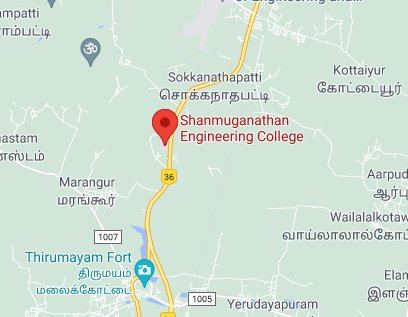ELECTRICAL AND ELECTRONICS ENGINEERING

This department offers subjects relevant to current Industrial needs like Power Electronics, Electrical Machines, both DC & AC, Control and Instrumentation, Microprocessors & Microcontrollers, Solid State Industrial Drives, High Voltage Engineering and Power System Engineering and so on. The department has engineering design and analytical tools such as MATLAB with SIMULINK and necessary tool boxes, AU Power Laboratory, and Power System Simulation Laboratory with required software
FACULTY

Dr. M. Varadarajan, Ph.D
Professor & HoD

Mr. S. Sabariraja, M.E.,
Assistant Professor

Mr. M. Mahibalan, M.E.,
Assistant Professor

Mrs. M. Raja Prasanna, M.E.,
Assistant Professor

Mrs.M.Iswarya, M.E.,
Assistant Professor
Vision
To be a center of excellence for technological education, training & research and to equip the students with the innovations and developments in the field of Electrical and Electronics Engineering, enabling them to become employable, successful and responsible citizens of the country.
Mission
To provide intensive training in the fundamentals as well as the current trends in the field of Electrical and Electronics Engineering, to continuously update the various facilities in the department and facilitate R&D and to disseminate knowledge by organizing seminars, Faculty Development Programs and Workshops.
PROGRAMME EDUCATIONAL OBJECTIVIES (PEO's)
1.To prepare the students have successful career in industry and motivate for higher education.
2.To provide strong foundation in basic science and mathematics necessary to formulate, solve and analyze electrical and electronics problems
3.To provide strong foundation in circuit theory, field theory, control theory and signal Processing concepts.
4.To provide good knowledge of Electrical power apparatus and their applications in power systems
5.To provide knowledge on basic electronics to power electronics and their applications in power engineering
6.To provide an opportunity to work in inter disciplinary groups
7.To promote student awareness for life long learning and inculcate professional ethics
8.To provide necessary foundation on computational platforms and software applications related to the respective field of engineering.
PROGRAMME OUTCOMES (PO's)
1.Ability to understand and apply differential equations, integrals, matrix theory, probability theory.
2.Ability to understand and apply basic science, circuit theory, Electro-magnetic field theory control theory and apply them to electrical engineering problems.
3.Ability to model and analyze electrical apparatus and their application to power system.
4.Ability to understand and analyze power system operation, stability, control and protection.
5.Ability to handle the engineering aspects of electrical energy generation and utilization.
6.Ability to understand and analyse, linear and digital electronic circuits.
7.Ability to review, prepare and present technological developments.
8.Ability to form a group and develop or solve engineering hardware and problems.
9.To understand and apply computing platform and software for engineering problems.
10.To understand ethical issues, environmental impact and acquire management skills.
PROGRAMME SPECIFIC OBJECTIVIES (PSO’s)

Facilities
- AC & DC Machines Laboratory
- Control System Laboratory
- Measurement and Instrumentation Laboratory
- Circuits and Devices Laboratory
- Power Electronics Laboratory
- Power System Simulation Laboratory
- Linear and Digital Integrated Circuits Laboratory
- Electrical Machines Laboratory
- Microprocessor and Microcontroller Laboratory



